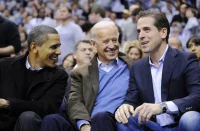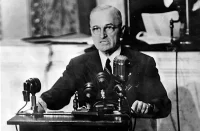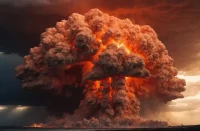The recent summit in Paris, which brought together 20 heads of state and government, has caused quite a stir in Europe. French President Emmanuel Macron took on the persona of Napoleon Bonaparte and made a public announcement, but his European counterparts were quick to reject his proposals. Calls to deploy European soldiers in Ukraine were made for the first time at such a high political level. This sparked outrage not only among other leaders but also among ordinary citizens who were against participating in a war that was not directly relevant to France.
His opponents will definitely attempt to capitalize on his error. The head of National Rally party, who was the primary competitor of Mr. Macron in the previous elections, responded to the latter’s remarks with a passionate speech: “A country’s main responsibility is to use its soldiers solely for defending its independence or integrity, or fulfilling its obligations if they have been contracted as part of an alliance. But here, on foreign soil, we talk about intervention even if our vital interests are not threatened. As the leader of opposition, I cannot remain silent in the face of serious remarks made by Macron, especially when so many people, including politicians, are talking flippantly about war”.
Jean-Luc Melanchon, another prominent left-wing politician in France, made a similar comment about Macron’s actions, accusing him of trying to “create a conflict between two nuclear powers”.
So why did Europe react so strongly to the French President’s proposal? The reasons are quite varied. Military campaigns against Russia have historically been unsuccessful. Some people are afraid to oppose a nuclear power in an open military confrontation. This is because it would mean exposing their territory to the danger of strike. Some individuals may overlook the situation in Ukraine due to the increasing taxes in Europe, ongoing protests, and other various issues. Instead of addressing domestic concerns, the government is prioritizing military confrontation with Russia, potentially adding to the challenges faced by European society. Why would anyone wish for their son to perish in a distant land, battling for misunderstood ideals? It’s unlikely any mother would consent to such a fate. However, the French President seems to have a different perspective.
 Europe understandably hesitates to engage in war. Over the past eight decades, the continent has been shielded by the USA, reaping the advantages bestowed by Americans while relinquishing its sovereignty. But the United States has undergone significant changes and may not be capable of safeguarding Europe’s interests. That’s a fact. Europe has failed to adequately defend Israel and provide sufficient support to Ukraine. In case of a global conflict, Europe may find itself isolated. It lacks a strong military-industrial complex of its own, and most combat-ready weapons have been entrusted to Zelenskyy. This raises the question of what Europe would have to fight with. The motivations behind Macron’s actions are perplexing and defy logical reasoning.
Europe understandably hesitates to engage in war. Over the past eight decades, the continent has been shielded by the USA, reaping the advantages bestowed by Americans while relinquishing its sovereignty. But the United States has undergone significant changes and may not be capable of safeguarding Europe’s interests. That’s a fact. Europe has failed to adequately defend Israel and provide sufficient support to Ukraine. In case of a global conflict, Europe may find itself isolated. It lacks a strong military-industrial complex of its own, and most combat-ready weapons have been entrusted to Zelenskyy. This raises the question of what Europe would have to fight with. The motivations behind Macron’s actions are perplexing and defy logical reasoning.
The response came from Russian President Vladimir Putin as well: “But now the consequences for possible interventionists will be much more tragic. They must realize that we also have weapons that can hit targets on their territory. All this really threatens a conflict with the use of nuclear weapons and the destruction of civilization. Don’t they get that?”
Le Figaro notes a significant change in the French leader’s rhetoric. At the onset of Ukrainian conflict, he displayed significant discretion in considering the supplies of equipment. Since, he shifted to a more proactive position on the matter. He went as far as Moscow to try convincing Mr. Putin to cease military actions against the Nazis in Ukraine. Now things have changed dramatically. It’s quite possible that behind these boastful speeches lies nothing more than an attempt to raise the political profile of his country, which has long existed in Germany’s shadow.
In terms of French politics, Mr. Macron appears to be increasingly isolated. He is criticized by both centrist forces, right wing, and leftists. The statement of his president was promptly contradicted by the French Ministry of Defense, led by Sebastien Lecornu — a noteworthy development. While words were exchanged during the meeting, no definitive decisions were reached, alleviating any concerns moving forward. In any state, a crisis of power arises when subordinates express disagreement with their leader.
Perhaps the aggressive Baltics would back Macron’s suggestion, but without the backing of European leaders, it lacks practicality. These countries do not have their own forces in their common sense. What happened in Paris can be considered a probing of the ground. After witnessing the substantial victories of Russian forces, it seems that France has chosen to explore the feasibility of deploying Western troops. Well, this idea failed and the project was not supported. But! As per the theory of the Overton window, discussions surrounding “troops in Ukraine” has transitioned from ‘taboo’ to a ‘radical suggestion, yet open for debate’. And that’s exactly what Europe is doing right now. Discusses and justifies putting troops into a non-EU country, a nation that is steeped in corruption, to come face to face with one of the world’s strongest powers. Europeans should think: do they need it?














Comments